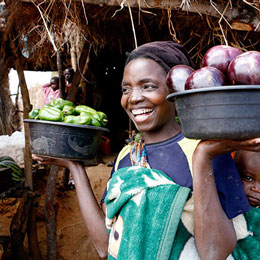Social and behavior change is a critical component of improving the nutritional status of key groups like women, children, and people living with HIV. FANTA’s work in this area spanned national, health facility, and community levels to achieve comprehensive, sustainable improvements that resulted in increased investments by national governments in social and behavior change services, optimal nutrition practices, demand for nutrition services and commodities, and utilization of services to prevent and treat malnutrition.
FANTA’s work included developing national social and behavior change strategies and creating materials for social and behavior change advocacy. FANTA also developed job aids and counseling materials for frontline service providers and community health workers to strengthen behavior change negotiation, and captured the results of these social and behavior change efforts through responsive monitoring and evaluation systems. FANTA’s approach focused on improving behaviors that directly benefit women, children, and people living with HIV while also reaching individuals and groups that directly and indirectly affect nutrition behaviors, such as men, communities, religious leaders, media, policymakers, civil society, and the private sector.



